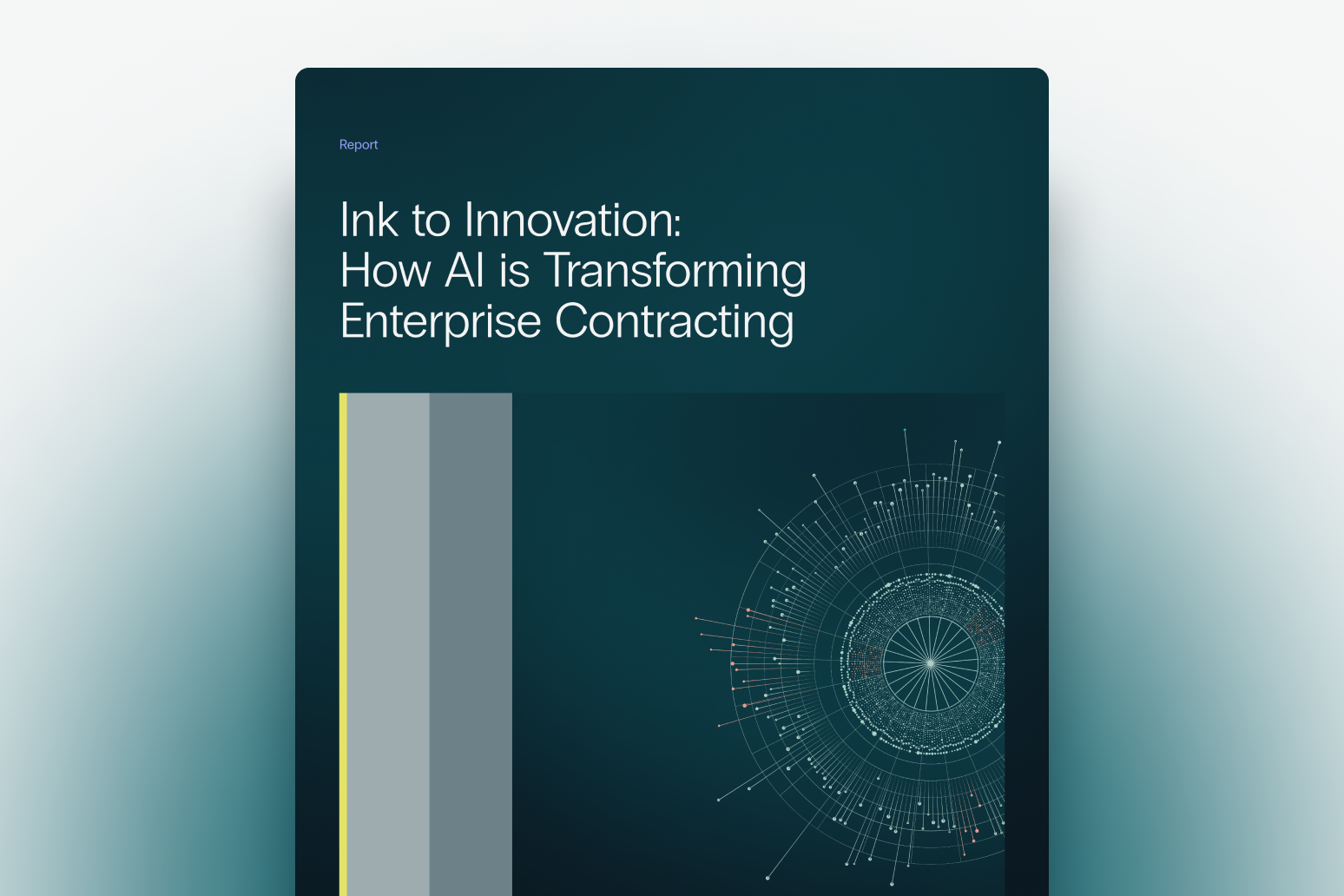Implementing Ethical AI in Enterprise Contract Management: A Practical Guide

- April 25, 2025
- 15 min read
- Arpita Chakravorty
Artificial intelligence (AI) is rapidly transforming contract lifecycle management, promising unprecedented efficiency and insight. From automated review to predictive risk analysis, AI tools offer compelling advantages. But as AI takes on more complex contractual tasks, especially within large, risk-averse enterprises, a critical question arises: How do we ensure this powerful technology is used ethically? For organizations dealing with sensitive data and high-stakes agreements, navigating the ethical landscape of AI in Contract management isn’t just good practice—it’s a business imperative crucial for maintaining trust, mitigating risk, and ensuring long-term compliance.
This guide moves beyond buzzwords to provide actionable strategies for implementing and governing ethical AI within your contract management processes. We’ll explore the core principles, identify key risks, outline practical implementation steps, and equip you to evaluate CLM vendor commitments effectively.
Ethical AI in CLM: Principles and Risks You Need to Manage
In contract lifecycle management, ethical AI means deploying systems that operate fairly, transparently, and securely—while keeping human oversight central. Getting this wrong isn’t just a technical flaw—it can lead to bias, data breaches, compliance violations, and a breakdown in trust.
Here are the key principles of ethical AI, along with the risks they help prevent:
- Fairness & Bias Mitigation
AI models often learn from historical contracts, which may reflect unbalanced terms or skewed practices. Without safeguards, these systems can reinforce bias—unfairly flagging clauses or generating skewed risk scores. Ethical AI actively detects and corrects this by using diverse training data, regular audits, and fairness metrics. - Transparency & Explainability
If a system flags a clause or assigns a risk level, users should know why. AI must offer explainable outputs—not just conclusions, but reasoning. Otherwise, decisions become hard to trust, audit, or challenge—especially in regulated industries. - Accuracy of Outputs
Generic models can misinterpret nuanced contract language. AI in CLM must be specifically trained on legal and procurement contexts to ensure it extracts terms, obligations, and risks accurately. Inaccurate insights create exposure and erode confidence. - Data Privacy & Security
Contracts contain confidential and legally sensitive information. Ethical AI demands strict data controls: encryption, access management, compliance with laws like GDPR and CCPA, and zero tolerance for misuse by vendors or third-party tools. - Accountability & Governance
When AI makes a bad call- drafts an error, mislabels a risk- who’s responsible? Clear accountability structures are essential. That includes defining who oversees AI outputs, how issues are flagged and resolved, and what safeguards are in place to prevent recurrence. - Reliability & Safety
AI tools must perform consistently and accurately across diverse contracts. A system that works well in one scenario but fails in another introduces legal risk. Rigorous testing and monitoring are required to ensure reliability over time. - Human Oversight
AI should assist, not replace, legal professionals. Defining where human judgment must step in—especially in high-risk or complex negotiations – is a cornerstone of ethical use. Overreliance on automation not only increases risk but may also erode team expertise over time. - Cost and Complexity of AI Implementation
Building and maintaining advanced AI is resource intensive. Enterprise-grade solutions must balance sophistication with manageability, delivering impact without requiring massive in-house data science investments.
By aligning these principles with your AI strategy, you don’t just avoid pitfalls – you set your organization up for sustainable, compliant, and trustworthy AI adoption in contract management.
Building a Strong Foundation: Strategies for Ethical AI Implementation
Moving from awareness to action requires a structured approach. Implementing ethical AI in your CLM processes involves establishing clear governance, adopting best practices, and fostering a culture of responsibility. Here’s how to start:
1. Establish Robust AI Governance:
- Form an Ethics Committee: Create a cross-functional team (Legal, Procurement, IT, Compliance, Data Science) to develop, oversee, and enforce AI ethics policies specifically for CLM usage.
- Develop Clear Policies: Document guidelines covering acceptable AI use cases, data handling protocols, bias mitigation strategies, required human oversight levels, and procedures for reporting and addressing ethical concerns.
2. Prioritize Data Handling and Privacy:
- Implement Data Minimization: Use only the data necessary for the specific CLM task.
- Employ Anonymization/Pseudonymization: Where feasible, remove or obscure sensitive identifiers in data used for AI training or broad analysis.
- Ensure Secure Infrastructure: Work with IT and CLM vendors to guarantee robust data encryption, access controls, and security protocols that meet or exceed industry standards and regulatory requirements.
3. Actively Mitigate Bias:
- Audit Training Data: Analyze historical contract data used for AI training to identify potential sources of bias.
- Use Diverse Datasets: Whenever possible, ensure training data reflects a wide range of contract types, counterparties, and scenarios.
- Implement Fairness Metrics: Utilize technical tools and statistical methods to test AI models for biased outputs and make necessary adjustments.
- Regular Testing: Continuously monitor AI performance for drift or the emergence of new biases.
4. Demand Practical Transparency:
- Seek Explainable AI (XAI) Features: When selecting tools, prioritize platforms that offer insights into why an AI made a specific recommendation or classification. Understand the levels of explainability offered – it might range from identifying key influential factors to providing more detailed logic trails.
- Document AI Processes: Maintain records of how AI models are trained, validated, and deployed within your contract management workflows.
5. Ensure Accuracy and Domain Fit
- Use Specialized Training: Select tools trained on contract-specific data—not general-purpose models—to improve relevance and reduce errors.
- Maintain Human Validation: Keep review loops in place for AI-generated content, especially in legal and compliance-critical contexts.
- Vendor Check: Has the vendor trained their AI specifically for procurement, legal, and commercial contracts?
6. Control AI Complexity and Cost
- Assess Scalability: Choose a solution that balances model performance with operational simplicity.
- Avoid Excessive Dependencies: Relying on multiple external models can complicate compliance and increase hidden costs.
- Vendor Check: Does the vendor build and maintain its own models in-house? What support exists for customization?
7. Design Effective Human-in-the-Loop Workflows:
- Identify Critical Checkpoints: Determine stages in the contract lifecycle (e.g., final approval of AI-drafted clauses, high-risk contract review, complex negotiation strategy) where human review and intervention are mandatory.
- Provide Contextual Information: Ensure AI tools provide sufficient context alongside their recommendations to enable informed human decision-making. Don’t just present an output; explain the basis for it.
8. Implement Regular Auditing:
- Schedule Periodic Reviews: Regularly audit AI systems and their outputs against your established ethical guidelines and performance benchmarks.
- Involve Third Parties: Consider independent audits for critical AI applications to ensure objectivity and validate internal findings.
Platforms designed with these principles in mind, such as Sirion’s AI-Native CLM Platform, can provide the foundational capabilities needed to implement these strategies effectively, offering features for data security, explainability, and configurable workflows that support human oversight.
Why Choosing the Right CLM Vendor Is So Difficult
Even with a clear ethical AI framework in place, finding a CLM vendor that truly aligns with these principles is challenging. Many platforms make bold claims about AI capabilities, but few offer transparency into how their models are trained, how data is handled, or how human oversight is built into their workflows. Vendors may tick some boxes—security, or explainability—but fall short on others like domain-specific accuracy or auditability.
The result? Organizations are often forced to compromise between functionality and ethics, or patch together multiple tools to meet their standards. That’s why it’s crucial to find a partner that delivers both—a platform where advanced AI is matched by deep accountability, purpose-built for contract work.
How Sirion Addresses Common Ethical AI Concerns in CLM
Sirion’s AI-Native CLM platform addresses key challenges that often hold legal and procurement teams back from embracing AI. Here’s how:
Explainability Built In
Sirion doesn’t just produce AI-generated recommendations—it shows the logic behind them. Every clause suggestion or risk highlight includes context and reasoning, helping users trust the output and stay compliant in audits and reviews.
Accuracy Through Domain-Specific Training
Sirion’s AI is trained on billions of contract-specific data points—not generic internet text. This legal-grade training enables highly accurate clause extraction, risk analysis, and negotiation suggestions across diverse contract types.
Multi-Model Architecture for Better Precision
Sirion combines large language models (LLMs) for natural language understanding and small data models (SDMs) for detailed analysis. This hybrid approach ensures nuanced insights for both short prompts and full-length contracts—minimizing errors while maximizing efficiency.
Security at the Core
Unlike vendors who rely on third-party models or external data flows, Sirion keeps AI processing secure within your environment. Customer data is never used to train shared models, ensuring complete control and confidentiality.
Cost-Effective and Scalable
By embedding AI into the core of its platform and building models in-house, Sirion avoids the complexity and overhead of external model integration—delivering high performance without requiring massive internal AI investment.
Proven Trust and Recognition
Sirion has been named a Leader in Gartner’s Magic Quadrant for CLM (2024) for the third year in a row and holds top scores in Spend Matters’ SolutionMap (Fall 2025). With a 4.8 rating on Gartner Peer Insights™, users consistently highlight its reliability, transparency, and ease of use.
Embrace the Future of Contracting—Responsibly
Ethical AI isn’t a side benefit—it’s central to long-term success in contract management. By addressing fairness, accuracy, explainability, privacy, and security, enterprises reduce risk, strengthen compliance, and enhance decision-making.
Sirion’s AI-Native approach ensures your contract processes are not only intelligent but trustworthy. As the regulatory environment evolves and contract complexity increases, platforms like Sirion provide a competitive edge—one grounded in transparency, precision, and security.
AI should move your contracting forward—without leaving ethics behind. With Sirion, you don’t have to choose between innovation and integrity. You get both.
Frequently Asked Questions (FAQ)
How can we get leadership buy-in for investing in ethical AI in CLM?
Frame it as a risk management and compliance issue – not just a tech upgrade. Emphasize the legal, reputational, and financial consequences of unethical AI use. Highlight that regulators are watching closely, and that building trust with customers and partners depends on responsible data and AI practices.
What kind of internal training do teams need to work effectively with AI-powered CLM tools?
Teams should understand how AI works in context – not at a technical level, but in terms of what it can (and can’t) do. Training should include interpreting AI outputs, identifying when to escalate to human review, and recognizing potential red flags in automated suggestions. A short, role-specific onboarding program goes a long way.
How can we tell if a vendor’s AI ethics claims are credible or just marketing spin?
Ask for specifics: How is their AI trained? Do they use your data to train shared models? What fairness or explainability metrics can they show? Ethical vendors will provide documentation, audit logs, and transparency into how decisions are made- not vague assurances or proprietary black boxes.
What are emerging AI risks in CLM we should prepare for next?
Beyond bias and privacy, watch for over-dependence on AI – where teams trust AI outputs blindly or let core skills atrophy. Also, regulatory changes are accelerating, especially in the EU and U.S. Staying compliant will require not just technical fixes, but regular audits and governance updates to keep pace.
Additional Resources


